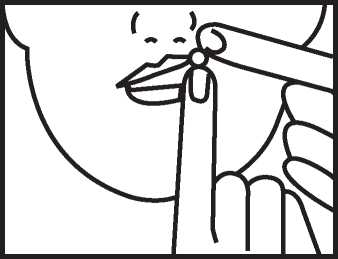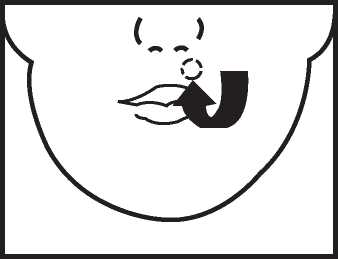Prochlorperazine Maleate 3 Mg Buccal Tablets
J


L
PC No.: 3205
5. HOW TO STORE PROCHLORPERAZINE MALEATE 3 MG BUCCAL TABLETS
Keep out of the reach and sight of children
Do not store above 25°C. Store in the original package
Do not remove the medicine form the blister until you are ready to take the medicine
Do not use the tablets after the expiry date stated on the blister and carton, after EXP. The expiry refers to the last day of the month
Medicines should not be disposed of via waste water or house hold waste. Ask your pharmacist how to dispose of medicines no longer required. These measures will help protect environment.
6. FURTHER INFORMATION
What Prochlorperazine Maleate 3 mg Buccal Tablets contains
Each tablet contains 3 mg of the active substance, Prochlorperazine Maleate.
The other ingredients are Sucrose, Povidone (K-30), Riboflavin Sodium Phosphate, Xantham gum (FF), Talc and Magnesium stearate
What Prochlorperazine Maleate 3 mg Buccal Tablets look like and contents of the pack
Prochlorperazine Maleate 3mg Buccal Tablets are Pale yellow to yellow, circular, biconvex uncoated tablets debossed with "P3" on one side and plain on the other side.
Prochlorperazine Maleate 3mg Buccal Tablets are available in blister packs containing 8 tablets.
Marketing Authorisation Holder and Manufacturer
Marketing Authorisation Holder and company responsible for manufacture: MEDREICH PLC
Warwick House, Plane Tree Crescent,
Feltham TW13 7HF, UK E-mail : info@medreich.co.uk
Prochlorperazine Maleate 3mg Buccal Tablets. PL No: 21880/0126 This leaflet was last revised in 06/2013
E
PACKAGE LEAFLET: INFORMATION FOR THE USER
Prochlorperazine Maleate 3 mg Buccal
Tablets
Read all of this leaflet carefully before you start taking this medicine:
• Keep this leaflet. You may need to read it again.
• If you have any further questions, ask your doctor or pharmacist.
• This medicine has been prescribed for you. Do not pass it on to others. It may harm them, even if their symptoms are the same as yours.
• If any of the side effects get serious, or if you notice any side effects not listed in this leaflet, tell your doctor or pharmacist.
In this leaflet:
1. What Prochlorperazine Maleate 3 mg Buccal Tablets are and what they are used for
2. Before you take Prochlorperazine Maleate 3 mg Buccal Tablets
3. How to take Prochlorperazine Maleate 3 mg Buccal Tablets
4. Possible side effects
5. Storing Prochlorperazine Maleate 3 mg Buccal Tablets
6. Further information
1. WHAT PROCHLORPERAZINE MALEATE 3 MG BUCCAL TABLETS ARE AND WHAT THEY ARE USED FOR
Prochlorperazine maleate belongs to a group of medicines called 'Phenothiazines'. It works by blocking the effects of a chemical in the brain.
Prochlorperazine can be used to:
treat nausea and vomiting in cases of previously diagnosed migraine.
2. BEFORE YOU TAKE PROCHLORPERAZINE MALEATE 3 MG BUCCAL TABLETS
You should only use this medicine if migraine has previously been diagnosed by your doctor.
Do not take Prochlorperazine Maleate 3 mg Buccal Tablets and tell your doctor if you:
• are allergic (hypersensitive) to Prochlorperazine maleate or any of the other ingredients of this medicine. Signs of an allergic reaction include a rash, swallowing or breathing problems, and swelling of your lips, face, throat or tongue.
• have liver problems
• have blood problems such as low red or white blood cell counts
• have Parkinson's disease
• have an enlarged prostate gland. This means you may have problems passing urine
• have narrow angle glaucoma (signs include painful eyes with blurred vision)
• have epilepsy
• are pregnant or you think you might be pregnant or breast feeding
• are under 18 years of age
Take special care and tell your doctor before taking the tablets if you:
• are elderly
• have high risk factors for a blood clot such as high blood pressure, high cholesterol levels, diabetes or smoking.
• or someone else in your family has a history of blood clots, as medicines like these have been associated with formation of blood clots.
The tablets may mask the signs of other illnesses you may get as they stop you from feeling sick and being sick. Look out for other signs of illness and tell your doctor if you are worried.
Taking other medicines
You should tell your doctor if you are already taking sedatives or tranquilisers, or you are being treated for high blood pressure (hypertension). Prochlorperazine Maleate 3mg Buccal Tablets may interact with these types of medicines.
Please tell your doctor or pharmacist if you are taking or have recently taken any other medicines, including those obtained without a prescription.
XXXXXXX
n
Illlllllll
This section is continued overleaf ^

r


Taking with food and drink
Prochlorperazine Maleate 3mg Buccal Tablets are best taken after food.
Do not drink alcohol when taking the tablets as it may interact with medicines like Prochlorperazine Maleate 3mg Buccal Tablets.
Pregnancy and breastfeeding
If you are pregnant or thinking of becoming pregnant, you should not take Prochlorperazine Maleate 3mg Buccal Tablets.
Experience with Prochlorperazine Maleate 3mg Tablets is limited. You should therefore not take the tablets if you are breast-feeding.
The following symptoms may occur in newborn babies, of mothers that have used Prochlorperazine Maleate 3mg Buccal Tablets in the last trimester (last three months of their pregnancy): shaking, muscle stiffness and/or weakness, sleepiness, agitation, breathing problems, and difficulty in feeding. If your baby develops any of these symptoms you may need to contact your doctor.
Ask your doctor or pharmacist for advice before taking any medicine.
Driving and using machines
Prochlorperazine Maleate 3 mg Buccal Tablets can cause side effects such as drowsiness, dizziness, light-headedness and movement problems. Do not drive or use machines if affected.
If you take more Prochlorperazine Maleate 3 mg Buccal tablets than you should
If you take too many tablets or a child swallows some, see your doctor immediately or contact the accident and emergency department of the nearest hospital. Take the medicine pack with you so the doctor knows what you have taken. Taking too many tablets may cause symptoms such as feeling sleepy or dizzy, increased or rapid heartbeat, feeling very cold and confused, writhing movements, feeling restless, stiffness or shaking. You may lose consciousness.
If you forget to take Prochlorperazine Maleate 3 mg Buccal Tablets
If you forget to take a dose do not double the dose next time. Just carry on taking the medicine as the doctor, pharmacist or nurse has told you.
4. POSSIBLE SIDE EFFECTS
Like all medicines, Prochlorperazine Maleate 3 mg Buccal Tablets can cause side effects, although not everybody gets them.
If you have a high temperature, pale complexion, muscle stiffness and changes in levels of alertness, you may have developed a serious condition called neuroleptic malignant syndrome. If you have these symptoms while taking the tablets, you should immediately inform your doctor.
Important information about some of the ingredients of Prochlorperazine Maleate 3mg Buccal Tablets
• Sucrose: This medicine contains Sucrose, a type of sugar. If you have been told by your doctor that you cannot tolerate some sugars, talk to your doctor before having this medicine.
3. HOW TO TAKE PROCHLORPERAZINE MALEATE 3 MG BUCCAL TABLETS
Other side effects include:
• drowsiness
• dizziness
• dry mouth
• inability to sleep (insomnia)
• agitation
• mild skin reactions
Do not swallow or chew the tablet.
Dosage
You must follow the instructions that your doctor has given you about how much and when to take Prochlorperazine Maleate 3 mg Buccal Tablets.
The usual dosage is one or two tablets twice a day for a maximum of 2 days, for adults aged 18 years or over.
These tablets are not recommended for children under 18 years of age.
Maximum dose is 4 tablets in any 24 hour period.
The tablet(s) is best taken after meals. How to use
Place the tablet high up along your top gum, under your upper lip, on either side of your mouth as indicated in the pictures opposite.
The tablet will soften and stick to your gum, and will take between about 1 and 2 hours to dissolve completely. Allow it to dissolve slowly and completely.
Most people find that after a few minutes they no longer notice the tablet.
Do not move the tablet around your mouth with your tongue as this will cause it to dissolve more quickly.
The tablet(s) is best taken after meals.
If you wear dentures, the tablet(s) may be placed in any comfortable position between your lip and gum.


XXXXXXX
• low blood pressure (this makes you feel dizzy or faint, particularly when you stand up), particularly in elderly or volume depleted patients (those who have lost both water and salts from the body).
• Blood clots in the veins especially in the legs (symptoms include swelling, pain and redness in the leg), which may travel through blood vessels to the lungs causing chest pain and difficulty in breathing. If you notice any of these symptoms seek medical advice immediately.
• In elderly people with dementia, a small increase in the number of deaths has been reported for patients taking medicines of the same type as Prochlorperazine Maleate 3 mg Buccal Tablets compared with those not taking these medicines.
Occasional
• local irritation to the gum and mouth may occur.
Rare
• jaundice (yellowing of the skin and/or the whites of the eyes)
• blood problems
Very rare
• breast swelling (in men as well as in women)
• abnormal movements, tremors and muscle rigidity, and unusual movements of the face and tongue.
These reactions are unlikely to happen with the low dose of prochlorperazine in this
medicine.
If any of the side effects gets serious, or if you notice any side effects not listed in this
leaflet, please tell your doctor or pharmacist.
More information is provided overleaf ^
n


r